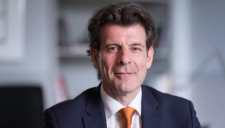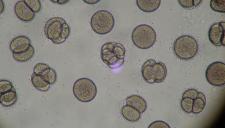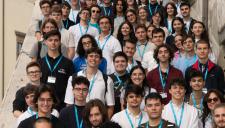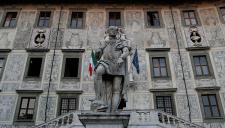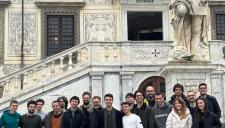We publish an article from Dr Sevgi Doğan about the risk condition affecting scholars around the world due to war or civil conflicts. The Scholars at Risk (SAR) international network has been founded in 1999 to protect these people. The Scuola Normale has been a member of SAR since 2018 and, if the pandemic emergency will allow it, will host in December 2020 the third international meeting of the network dedicated to “Re-thinking Academy: Freedom, Responsibility, Challenges”.
By Sevgi Doğan *
Wars, along with civil and political conflicts within a country, have always caused flows of people; intellectual immigration is an important aspect of this unfortunate circumstance. The relocation of academics and intellectuals is a relevant phenomenon because it deprives the country of those very forces capable of igniting new ways of scientific innovation, transferring this potential into a new context.
The Second World War with the escape of Jewish scholars and scientists from Nazi Germany constitutes an infamous precedent. One can recall the case of the Warburg Institute, that, having left Hamburg, found its new seat in London, where it still represents nowadays an important point of reference for studies in the humanities. Another example was set by the Institute for Social Research (Institut für Sozialforschung), best known as the Frankfurt School, that was founded in Frankfurt and, with the increasing power exerted by Nazis, moved first to Geneva and then, in 1934, to New York. One can also take the case of Erich Auerbach, critic and philologist, who found shelter in Turkey before leaving for the United States. The flux of intellectual immigration today goes in the opposite direction: Europe, in the drama of immigration, has become a privileged landing, facing a particular challenge, that of the reception or hosting of academics and intellectuals fleeing from conflicts.
A quick research will show us that, according to the most recent ‘Free to Think’ report (between September 2018 and August 2019) by the Scholars at Risk (SAR) Network, Nigeria, Pakistan and Syria were hit by violent attacks against scholars, students and their home institutions on the part of armed groups and individuals; Turkey has been the stage, and it still is, of radical actions against higher education institutions by government officials and higher education officers; in South Africa, Zimbabwe and Thailand students are being restrained; the conditions for a quality of higher education in Venezuela are worsening as student protests have been violently repressed by the government and demonstrators have been arrested; the freedom of movement of students and scholars for academic reasons is often restricted; in the Central and Eastern Europe there have been legislative and administrative attempts to close or to censor teaching and research institutions.
Intellectuals, scholars, scientists, researchers and artists bear a great responsibility towards society: increasing the quality of life and education through their research activities in various areas and disseminating the results at different levels from schools, to universities and to publications. However, the attacks to their academic freedom have charged them with a new responsibility, that of defending human rights: facing an increasing flux of intellectual immigration, many academic institutions and universities have implemented a policy of reception or hosting and protection of academic freedom.
What instruments can be used in order to welcome and protect the people who undergo attacks in relation to academic freedom in their country?
II. International and national SAR
At international level, there are several initiatives that have been undertaken to react to these harsh attacks. Standing out among them, one can find Scholars at Risk (SAR), a network of universities founded in 1999 at the University of Chicago, in the United States with current headquarter in New York University. The SAR Network is part of the Network for Education and Academic Rights (NEAR) and in 2002 it collaborated with the Institute of International Education (IIE) in establishing the Scholars Rescue Fund (RSF). One of the goals of SAR is to protect scholars in danger and allow them to carry out their research, thus promoting academic freedom. SAR in general helps academics and researchers coming from the global South to the global North. Among them, one can find students, journalists, judges, lawyers, managers or directors of NGOs and human rights defenders.
SAR is active on three different fronts:
- Protection. The main activity of the network is to find temporary academic positions for scholars of any discipline and from any country who have been dismissed and threatened. The positions offered by universities, academia or other no-profit organisations, governmental and intergovernmental institutions and entities, or companies, can vary from visiting fellow to visiting scholar, from researcher to research fellow, and from lecturer to visiting professor, or any other legitimate role. Such positions offer scholars the opportunity to resume their academic work in the hope that the evolving of the situation will allow them, at the natural end of the tenure, to start working again in total safety in their country of origin. Should the general conditions preclude this possibility, SAR will assist them in finding a long-term opportunity.
- Advocacy. SAR can launch initiatives aiming at raising the awareness of public and civil society on the issue of academic freedom. To this end, SAR organised student advocacy activities, regional partnerships, courses and seminars. All these actions aim to register the violations perpetrated against scholars, to train civil rights defenders, and to demand for social accountability. Teachers and students taking part in SAR’s seminars of student advocacy research the cases of academics and students unjustly imprisoned. Students can thus contribute to guaranteeing safe conditions for scholars and help demanding their release.
- Dissemination. Another significant activity organised by SAR is offering education on the subjects of academic freedom and the rights of academic refugees, human rights, and the policies of reception/hosting of academics at risk. SAR explored all of these themes through workshops, seminars, researches, events, etc.
Over 500 universities, research institutes and associations from 40 countries have joined SAR. Italian universities, research institutions and associations are also part of the network. In 2005, SAR and its members started building different “sections” and “partner networks” in the whole world: Israel (2005), the United Kingdom (2006, CARA), the Netherlands (2009, UAF), Ireland (2009, the University of Ireland), Norway (2011), Canada (2012), Switzerland (2015), Sweden (2016), Germany (2016), Finland (2017), the United States (2018), Denmark (2019), Italy (2019) and Slovakia (2019). Sections and networks can thus build a global community dedicated to help scholars and promote academic freedom.
One of these sections has been launched in Italy at the University of Padua on 19th February 2019. In 2017, many Italian institutions joined SAR or expressed their interest in becoming part of the network. During a meeting organised by the University of Padua on 12th December 2017, the partner institutions expressed their will to take the necessary steps to form an Italian section: SAR-Italy. When the section was launched in 2019, fourteen Italian universities, research institutions and associations, all members of the international SAR network, attended the first assembly. Currently, twenty-three (European University Institute, Magna Charta Observatory, SISSA International School for Advanced Studies –Trieste, Scuola Normale Superiore, Scuola IMT Alti Studi Lucca, University of Bologna, University of Brescia, University of Cagliari, University of Firenze, University of Genova, University of Macerata, University of Milano, University of Padova, University of Pavia, University of Pisa, University of Roma La Sapienza, University of Siena, University of Torino, University of Trento, University of Trieste, University of Venezia Cà Foscari, University of Verona, UniNettuno University) Italian universities, research institutions and associations are members of SAR-Italy. Italian universities, research institutes and associations adhering to the SAR network become part of SAR-Italy automatically. Throughout 2019-2021, SAR-Italy is coordinated by the University of Padua and the University of Trento, that had previously adopted policies in favour of reception or hosting and advocacy.
SAR-Italy aims to carry out the three activities described above at the national level through universities, institutions and associations, and sometimes through collaboration with the regions. The purpose of SAR-Italia is to host, protect at-risk scholars and to raise awareness of academic freedom and human rights in civil society and academia, as well as to promote research on issues related to SAR's mission. Italian section, in addition to supporting SAR activities at national level, seeks national and international funds and projects with the governmental or private partners. Italian universities, research institutes and associations host and integrate at-risk scholars into Italian universities.
SAR-Italy organised a number of international symposia in the last two years: the first one took place in February 2019 at the University of Padua in the framework of a Winter School titled “Knowledges at Risk: Universities Promoting Academic Freedom.” In December 2019, the University of Trento hosted the second international symposium called “Refugees and Higher Education: Hosting and Integrating Scholars and Students.” The third international event, titled “Re-thinking Academy: Freedom, Responsibility, Challenges”, will take place on December 2020 at the Scuola Normale Superiore, provided that the Covid-19 emergency will allow scholars, students and all those interested in the subject of academic freedom, to meet and discuss. Further information on the activity of SAR-Italy can be found in the 2019 annual report of SAR-national which was also presented to SAR-international.
Besides its scientific activities, SAR-Italy is also committed to pursue one of the principles of international SAR, i.e. the protection of academics who have been threatened or dismissed because of their defense of human rights or their critic position towards the government. To this end, some universities are already offering scholarships covering periods from 3 months to one year. The Scuola Normale Superiore is one of the institutions hosting scholars at risk.
III. A story of solidarity
In March 2018, the Scuola Normale Superiore joined the international SAR network. The process was initially hindered by bureaucratic difficulties; however, the fundamental aspect was meeting the right persons, discussing and explaining them how SAR works and what its objectives are. The staff in charge of International Relationships at the Scuola Normale, Elisabetta Terzuoli and Prof. Andrea Ferrara, who was then Vice-Director for Didactics, Internationalisation and Placement, played a fundamental role in raising the attention of the scientific community towards SAR. Professor Ferrara declared: “The whole community of the Scuola Normale strongly supports the adhesion to the network. We are proud to defend freedom of research wherever it is threatened. This ideal is an essential part of the history and culture of the SNS.”
In February 2019, the Scuola Normale Superiore was thus one of the 14 universities, research institutions and associations that founded the Italian section of SAR. Together with the University of Cagliari, Padua, Trento and Trieste, the SNS is part of the Steering Committee of SAR-Italy. Just after entering the network, the Scuola Normale managed to put into practice one of the principles of national and international SAR: that of protection. In the meantime, the Director of the Scuola, Prof. Luigi Amborsio, who strongly believes in the project, appointed Prof. Lorenzo Bosi as academic spokesman for the initiative. The Manager in charge of the Internationalisation office, Daniele Altamore, who is also Secretary-General of the Associazione Amici della Scuola Normale Superiore, has always supported the project and successfully worked to ensure the funding needed for hosting a scholar at risk. The Scuola Normale, with the support of the Associazione Amici della Scuola Normale Superiore and of Regione Toscana, accomplished to offer a Kurdish researcher from Turkey, Delal Aydin, a research grant that allows her to continue her research activities for 12 months at the Faculty of Political and Social Sciences in Florence.
The activities of Scholars at Risk target to offer academics at risk the opportunity to build, or re-build, their professional network through speaker series, seminars, symposia and conferences. Thanks to SAR’s speaker series, scholars protected by the programme can travel in order to hold conferences or participate in panels and other events organised by universities in the host countries, thus pursuing also the goal of advocacy. Unfortunately, the current health emergency drastically reduced this kind of activities.
Notwithstanding the Covid-19 outbreak, Tuscan universities – the Scuola Normale Superiore, the University of Pisa, the University of Florence, the European University Institute (EUI), the University of Siena and the IMT School of Advanced Studies Lucca, that recently joined the network – wish to institute a regional section in order to pursue a better coordination at regional level. This project will prove an important initiative for both the activities of reception or hosting and advocacy.
Since its affiliation with the Scholars at Risk network, considering the repression of intellectuals not only an attack towards a group of people who only perform their job, but also an attack to a society that is nurtured by the debate around those very ideas raised by scholars, the Scuola Normale Superiore has been focusing its attention on the situation of extreme distress experienced by many scholars and academics in particular from Turkey.
Academic freedom is a fundamental part of society in each country but is unfortunately in danger in the whole world and it needs to be protected.
* Dr. Sevgi Doğan is a Research Fellow within the group Emerging Research on International Security (ERIS) and Strategic Project: Governance for Inclusive Societies at the Dirpolis Institute of the Sant’Anna School of Advanced Studies in Pisa (Italy). She is working on the project regarding academic freedom and the digital age. She is also conducting the project of CREATES (Creating Responsive, Engaging, and Tailored Education with Students) at the same university. She is currently cooperating - as person in charge of development initiatives of SAR (Scholars at Risk) network in Italy - within the Internationalization Office at the Scuola Normale Superiore in Pisa (Italy). At the Scuola Normale Superiore in Pisa, she also earned her PhD in 2014. Her doctoral thesis, Marx and Hegel: On the Dialectic of the Individual and the Social, has been published by Lexington Books (2018), in the USA. Her fields of research are the modern and contemporary political philosophy, Marxism, Hegelianism, German idealism, Italian philosophy, Italian idealism and Marxism, Critical Theory, Frankfurt School, authoritarianism and totalitarianism, gender studies, Rosa Luxemburg, philosophy in Turkey, social and political modernization of Turkey, academic freedom. She has translated Gramsci’s Letters from Prison (Lettere dal Carcere) from Italian into Turkish and submitted it to Alfa publishing house.



